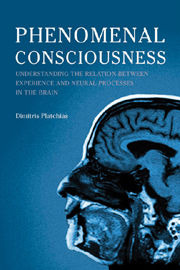Book contents
- Frontmatter
- Contents
- Acknowledgements
- Miscellaneous Frontmatter
- Introduction
- 1 The nature of the mind
- 2 Phenomenal consciousness: the hard problem
- 3 Phenomenal consciousness and the “sufficiency” claim
- 4 Experience and first-order representationalism
- 5 Experience and the explanatory gap
- 6 Experience and higher-order representationalism
- Notes
- Bibliography
- Index
1 - The nature of the mind
- Frontmatter
- Contents
- Acknowledgements
- Miscellaneous Frontmatter
- Introduction
- 1 The nature of the mind
- 2 Phenomenal consciousness: the hard problem
- 3 Phenomenal consciousness and the “sufficiency” claim
- 4 Experience and first-order representationalism
- 5 Experience and the explanatory gap
- 6 Experience and higher-order representationalism
- Notes
- Bibliography
- Index
Summary
SUBSTANCE DUALISM
In this chapter, I shall present the main philosophical positions on the nature of mentality, such as substance dualism, physicalism and functionalism. This will enable us to locate the subject matter of this book within broader discussions of the mind–body problem. In this section, I shall look at substance dualism and, in particular, at the Cartesian conception of the mind. René Descartes' project in the Meditations on First Philosophy is a quest for indubitable truths. Descartes famously applies the method of universal doubt to “all things” in an attempt to empty the mind completely of all traditional views and preconceived ideas in order to show beyond all further doubt that truth is possible. To do this, he lays down three increasingly powerful layers of doubt. He begins his enquiry by doubting the “deliverances” or the “testimony” of the senses. Surely there is a clear sense in which our senses can deceive us; cases of perceptual error, such as illusions and hallucination, are suggestive enough. His next step was to claim that he sees “so manifestly that there are no certain indications by which we may clearly distinguish wakefulness from sleep that I am lost in astonishment. And my astonishment is such that it is almost capable of persuading me that I now dream” (1996: 13). According to Descartes, since his vivid dreams were indistinguishable from waking experience, it was possible that everything he “saw” to be part of the external (physical) world outside him was, in fact, nothing more than a fabrication of his own imagination. It was then possible to doubt that any physical thing really existed or whether there was an external world at all. Descartes’ final step was to introduce the “demon” hypothesis: the possibility that there is “a malignant demon who is at once exceedingly potent and deceitful” (1998: 12) that not even these items of knowledge can survive.
- Type
- Chapter
- Information
- Phenomenal ConsciousnessUnderstanding the Relation between Neural Processes and Experience, pp. 7 - 48Publisher: Acumen PublishingPrint publication year: 2010

